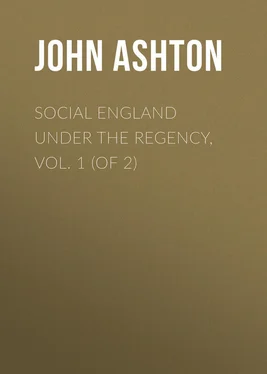John Ashton - Social England under the Regency, Vol. 1 (of 2)
Здесь есть возможность читать онлайн «John Ashton - Social England under the Regency, Vol. 1 (of 2)» — ознакомительный отрывок электронной книги совершенно бесплатно, а после прочтения отрывка купить полную версию. В некоторых случаях можно слушать аудио, скачать через торрент в формате fb2 и присутствует краткое содержание. Жанр: foreign_antique, foreign_prose, на английском языке. Описание произведения, (предисловие) а так же отзывы посетителей доступны на портале библиотеки ЛибКат.
- Название:Social England under the Regency, Vol. 1 (of 2)
- Автор:
- Жанр:
- Год:неизвестен
- ISBN:нет данных
- Рейтинг книги:4 / 5. Голосов: 1
-
Избранное:Добавить в избранное
- Отзывы:
-
Ваша оценка:
- 80
- 1
- 2
- 3
- 4
- 5
Social England under the Regency, Vol. 1 (of 2): краткое содержание, описание и аннотация
Предлагаем к чтению аннотацию, описание, краткое содержание или предисловие (зависит от того, что написал сам автор книги «Social England under the Regency, Vol. 1 (of 2)»). Если вы не нашли необходимую информацию о книге — напишите в комментариях, мы постараемся отыскать её.
Social England under the Regency, Vol. 1 (of 2) — читать онлайн ознакомительный отрывок
Ниже представлен текст книги, разбитый по страницам. Система сохранения места последней прочитанной страницы, позволяет с удобством читать онлайн бесплатно книгу «Social England under the Regency, Vol. 1 (of 2)», без необходимости каждый раз заново искать на чём Вы остановились. Поставьте закладку, и сможете в любой момент перейти на страницу, на которой закончили чтение.
Интервал:
Закладка:
It would seem that all parties were trying to make the Services unpopular: the navy, especially, by impressment – and even the Militia did not escape – for in January, a number of farmers and others were summoned before the magistrates at Stafford for making deductions from the wages of those servants who were enrolled in the Militia and who had been absent for their training. It must be remembered that in those days farm labourers were hired at Statute fairs, for a twelvemonth, and the 15th clause of 48 Geo. III. cap. 3, had to be shown to those summoned, whereby they learned that no ballot, enrolment, or service under the Act should make void or in any manner affect, any indenture of apprenticeship, or contract of service. And so they had to pay their men.
They were rather a rough lot in the Country, and this anecdote is thus recorded in The Times of January 31, 1811: – "The following ludicrous 3 3 The italics are mine. – J. A.
circumstance occurred on Tuesday week at Bristol: – A couple of Jews being apprehended in the act of stealing several articles from the stables of the White Hart Inn, were hauled into the yard by two stout fellows, whither the whole fraternity of the currycomb were immediately summoned. The long beards of these disciples were then stuck together with pitch (their hands being previously tied behind them); and, whilst thus face to face, a profusion of snuff mixed with hellebore, was administered, which caused them to sneeze in such a manner, that by the frequent and violent bobbing of noses one against the other, a copious stream of blood issued from either nostril, whilst the enraged Culprits were kicking and capering about in all directions."
Chronologically, we must now turn to the Prince of Wales, who, one would imagine, was desirous of emulating the Squires of old, who spent the eve of their knighthood in vigil, prayer, fasting, and watching their armour – so before he became Prince Regent, he must needs partake of the Holy Eucharist, and did so at the Chapel Royal St. James' on Sunday the 27th of January, the sole object of which was to obtain a certificate that he was in the Communion of the Church of England . This public act of worship was a stately affair. The Prince was in the Royal Closet during the major portion of the service, the Bishop of London and sub-dean duly bowing to the royal presence, at their entrance. Afterwards, attended by the Earl of Moira, and Lords Dundas and Keith, he went up to the Altar, took his seat under a canopy, made his offering in a gold dish, and then the Dean, Prince, and the three Lords Communicated.
On the 5th of February the Lords and Commons had their final conference over the Regency Bill, they agreed to the interpolation of two words "and Commons," and the thing was all but finished. It only wanted what was done immediately afterwards, the Royal Commissioners to give the Royal Assent, the Deputy Clerk of the Crown to read the title of the Act, the Clerk Assistant of the Parliaments to utter the words "Le Roi le veult" – and the Prince of Wales was de facto Regent.
Knowing his proclivities, it was imagined that he would give places to all his entourage , and, accordingly, we have the caricature of "Robeing the Prince, or the Road to Preferment." To the extreme left is Earl Grey, who says "A bason of Grey pease soup is better than porter for your Highness," but Whitbread is of opinion that "If his Highness should want any refreshment, here's a pot of my best brewing." Grenville offers his services to the Prince. Sheridan hopes "your Royal Highness will not forget Old Sherry ; pray allow me to brush the Royal shoes, they seem quite mouldy with lieing by so long." Colonel Bloomfield is tying his garter. Whoever is holding the looking-glass exclaims, "What an honour this is! but I hope for greater." The Regent tells Sheridan, "Fear not, my friend, all in good time." Col. McMahon says, "Why! can't you see you have given him the wrong sleeve; do give it to me, you'll make a fine figure of him!" But the person holding the robe replies, "Don't push so, Col., you won't let any one come near his Highness but yourself." Mr. Adam, the Prince's Chancellor, soliloquises thus, "A dam good prospect now, however." Sir John Douglas calls out, "Who wants me?" and Col. Geo. Hanger, hopes "you won't forget poor Georgy."
Perhaps the three best known of these Companions of the Prince are Sheridan, Col. McMahon, and George Hanger. The first belongs to history, and the second will be noticed by and by. Col. Hanger came of a noble Irish family, but in his youth led a wild harum scarum life. Of course he entered the army, and whilst holding the King's Commission he fell in with, and joined a gang of gipsies, when he fell in love with a dusky beauty, and married her according to the customs of her tribe, which, probably, only involved the jumping over a broomstick. He introduced her to his brother officers, and all went well for about a fortnight, when she eloped with a bandy-legged tinker. His tastes were congenial to those of the Prince, and he made himself useful, bought horses for him, looked after his racing arrangements, and was one of his equerries, which post he kept until he was, by his extravagance, compelled to resign it. He was more than once imprisoned for debt, but turned steady after the death of his brother Lord Coleraine (called blue Hanger , from the colour of his garments) in 1814, when he succeeded to the title, which became extinct on his death in 1824.
Meanwhile, all was being prepared for the assumption of the Regency, Carlton House was being brushed up, chandeliers cleaned, &c., a congenial task for its occupier, the Hanoverian creams were publicly exercised, and made to pass between files of soldiers, and, at last, the 6th of February, the day appointed for the Prince to take the oaths, arrived. The following is probably an official communiqué , as it appears in all the Newspapers of the period: —
"The 6th of February being the day appointed for swearing in the Prince of Wales as Regent, before his taking upon himself that important office, about twelve o'clock a party of the flank companies of the grenadiers, with their Colours, the band of the first regiment, drums and fifes, with white gaiters on, marched into the courtyard of Carlton House, where the colours were pitched in the centre of the grand entrance; the band struck up 'God save the King,' and continued playing that national piece alternately with martial airs during the day, until near five o'clock. Colonel Bloomfield, one of the Prince's principal attendants, having written to the Earl of Macclesfield, the Captain of his Majesty's yeomen of the guard, informing him it was his Royal Highness' command that as many yeoman of the guard should attend at Carlton House, as usually attended upon councils being held by the King in state, the noble Earl not being in London, the letter was opened by the person in waiting, who ordered six yeomen and an usher to attend at Carlton House, which they accordingly did; and they, together with the Prince's servants in state, lined the grand hall and staircase: several of the lifeguards men were also in some of the rooms, in a similar manner as on Court-days at St. James' Palace. About a quarter before two o'clock, the Duke of Montrose arrived, being the first of the privy councillors who attended; he was followed by all the royal dukes, and a very numerous assembly of privy councillors, who had all arrived by a quarter before three o'clock. The whole of the magnificent suite of state apartments were opened, and the illustrious persons were ushered into the Gold Room (so called from the style of the ornaments). Almost every privy councillor then in town was present – exceeding above a hundred in number.
"About half-past two o'clock, Earl Moira, of his Royal Highness' council, being also a privy councillor to the King, brought a message from the Prince to the President of the Council, Earl Camden, desiring his attendance on the Prince in an adjoining room, according to the usual form, to communicate to him officially the return to the summons, &c. The noble Earl accordingly went with Earl Moira, made the necessary intimation to his Royal Highness, and returned to the company; who, during this time of waiting were highly gratified with seeing the Princess Charlotte on horse-back, accompanied by two grooms, make the tour of the beautiful gardens in the rear of the palace. Her Royal Highness appeared to be in excellent health and spirits.
Читать дальшеИнтервал:
Закладка:
Похожие книги на «Social England under the Regency, Vol. 1 (of 2)»
Представляем Вашему вниманию похожие книги на «Social England under the Regency, Vol. 1 (of 2)» списком для выбора. Мы отобрали схожую по названию и смыслу литературу в надежде предоставить читателям больше вариантов отыскать новые, интересные, ещё непрочитанные произведения.
Обсуждение, отзывы о книге «Social England under the Regency, Vol. 1 (of 2)» и просто собственные мнения читателей. Оставьте ваши комментарии, напишите, что Вы думаете о произведении, его смысле или главных героях. Укажите что конкретно понравилось, а что нет, и почему Вы так считаете.












